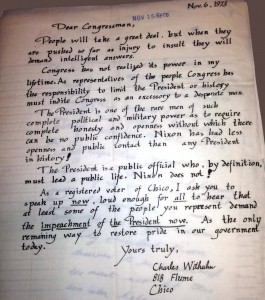Impeachment: Contextualizing a Primary Document
 **This is an example of how one can contextualize a primary source document using “soft research” skills. It is not authorized for reuse by anyone, under any condition, except with the expressed consent of Sean Kelly, Professor of Political Science, California State University Channel Islands.***
**This is an example of how one can contextualize a primary source document using “soft research” skills. It is not authorized for reuse by anyone, under any condition, except with the expressed consent of Sean Kelly, Professor of Political Science, California State University Channel Islands.***
On November 6, 1973 Charles Withuhn of Chico, California, wrote to Harold T. “Bizz” Johnson to express his opinion about the potential impeachment of then-President Richard Nixon. Earlier in 1973 evidence began to mount that President Nixon was involved in a plan aimed at collecting information on his political enemies. The conspiracy and the aftermath that followed is known as Watergate.
In Mr. Withuhn’s opinion, the time had come to remove the president from office using Congress’s power of impeachment. Section 4 of the Constitution provides that “The President, Vice President and all civil Officers of the United States, shall be removed from Office on Impeachment for, and Conviction of, Treason, Bribery, or other High crimes and Misdemeanors.” Article 1, Section 2 provides the House with the power to impeach the president—that is, to promulgate a bill of particular justifications for removal of the president—which is approved by a simple majority in the House. The Senate can remove the president with a two-thirds majority of Senators (Article 1, Section 3).
Mr. Withuhn argues that the Congress, up to this point, has not exercised its full constitutional powers. “Congress has not realized its power in my lifetime.” In his view “…Congress has the responsibility to limit the President or history must indite [sic] Congress as an excessory [sic] to a desperate man.” He seems to be arguing that if Congress fails to remove the president they are culpable for Nixon’s illegal actions.
One wonders what might have motivated Mr. Withuhn to send a letter to Bizz Johnson. Three weeks prior to this letter it was discovered that Nixon recorded all conversations and telephone calls in the Oval Office. These tapes were powerful evidence and Nixon refused to turn them over. About two weeks prior to this letter, Richard Nixon fired Archibald Cox, a special prosecutor who was assigned to investigate the events surrounding Watergate. This became known as the “Saturday Night Massacre” as several of Nixon’s aids refused to carry out the order to fire Cox and were fired themsleves. Robert Bork, who would later be nominated to the Supreme Court—a nomination defeated in the Senate—was the White House aid who ultimately carried out Nixon’s order.
While the writer does not mention these events, it is likely that these events are reflected in his general feeling that the presidency requires “complete honesty and openness without which there can be no public confidence.” Withuhn does suggest that Bizz, as a member of Congress, has a responsibility to reflect the wishes of his constituents. “As a registered voter of Chico, I ask you to speak up now, loud enough for all to hear, that at least some of the people you represent demand the impeachment of the President now.”
Formal articles of impeachment were never brought forward against President Nixon. As the House moved toward approving articles of impeachment in August 1974, President Nixon resigned. This document is a reflection of the strong feelings that many Americans had about the events surrounding Watergate. Never in our history has a president been removed from office by Congress. But at the time, Mr. Withuhn was willing to push Bizz Johnson toward that action. In his words, the removal of Nixon was “the only remaining way to restore pride in our government…”
